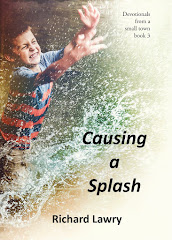An Arkie's Faith column from the December 28, 2016, issue of The Mena Star
During the Christmas season, my wife and I made a trip out of town to do some Christmas shopping. In the early afternoon, we took a break to get something to eat. The lunch rush was over, so the quaint little restaurant was not busy. We were thankful for the peaceful atmosphere.
Our waiter was rather ordinary in appearance and older than the rest of the wait staff. He was not very tall but was neatly dressed in slacks, dress shirt, and tie. He said, “my name is Tony.” As Tony waited on us, we noticed that he was very professional and wanted everything to be perfect. Any squeezed lime, empty sweetener packet, or used napkin were quickly removed from our table. When we commented on how well he was taking care of us, he was pleased.
Because it was mid-afternoon, the restaurant was not busy. We were Tony’s only patrons. During the meal, whenever Tony was at our table we asked about his story. My wife loves meeting new people and was curious about Tony’s move from France to Arkansas. We learned that in France, Tony had worked in the service industry. He had a long-time job at a hotel. One day he met a lady from the U.S. while he was working. They hit it off immediately. When she returned to America, they stayed in contact.
Tony decided to travel to the U.S. to see his new friend. After a whirlwind romance, they were married in Las Vegas. That was fifteen years ago, and he is still happily married and living in Ft. Smith, Arkansas. Tony said that he loves Ft. Smith because it is a quiet, peaceful place but big enough to have everything he needs. He was proud of the fact that he has been an American citizen for one year.
I was intrigued by the multinational aspects of Tony’s story. A baby born in Morocco to Spanish parents who spent many years in France; fell in love with an American; moved to the U.S. and became an American citizen. He now lives happily in Arkansas and does a great job taking care of the patrons in a small restaurant.
As I thought about Tony and the places that he has lived, I was reminded that the Bible says that all Christians are citizens of the Kingdom of God. In Galatians 3:26-28 (NIV) the Bible tells us that, “in Christ Jesus you are all children of God through faith, for all of you who were baptized into Christ have clothed yourselves with Christ. There is neither Jew nor Gentile, neither slave nor free, nor is there male and female, for you are all one in Christ Jesus.”
Unfortunately, in society, those distinctions make a big difference. What neighborhood are you from? Where did you grow up? What color is your father's skin? These things end up separating us. We use race and nationality to decide people’s place in society. But with Jesus, there are no second-class citizens!
In God’s Kingdom, there is neither “male nor female.” Now, that doesn't mean that men and women aren't different. But the Bible says that they are equal under God in every way. Men and women may not be equal in the world, but in Jesus they are!

















